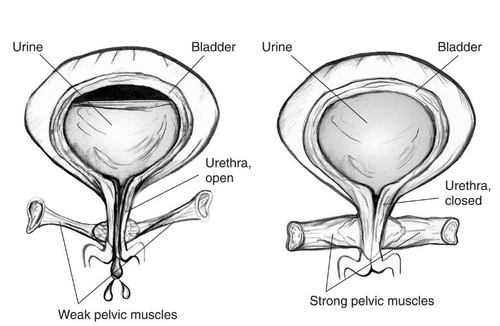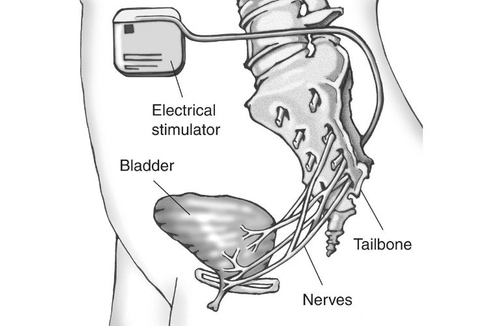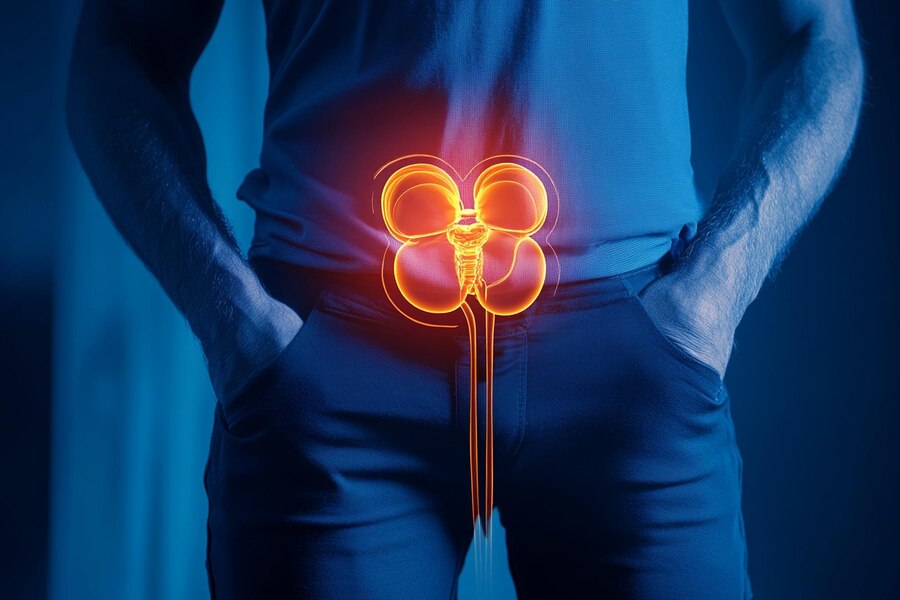Stress is an unavoidable part of life, but did you know that it can significantly affect your urological health, particularly your bladder control? For many people, chronic stress can lead to overactive bladder (OAB) symptoms, which can severely impact quality of life. If you’re struggling with bladder control issues, understanding the link between stress and urological health is crucial. Here, we’ll explore how stress affects bladder function and offer practical solutions for managing it. Drawing from the extensive experience and expertise of Dr. Ashit Shah, Senior Consultant Urologist at Aashray Urology Institute in Vadodara, Gujarat, we'll also discuss the importance of seeking professional help.
1. How Does Stress Affect Bladder Control?
Stress triggers a variety of physiological responses in the body, many of which can adversely affect bladder function. Here’s a detailed look at how stress influences urological health:

- Overactive Bladder (OAB): Stress can exacerbate the symptoms of an overactive bladder by affecting the autonomic nervous system, which controls bladder function. During stressful situations, the body releases stress hormones like cortisol and adrenaline, which can increase muscle tension, including in the pelvic floor muscles. This can lead to more frequent and urgent urination.
- Urinary Incontinence: Chronic stress can aggravate urinary incontinence, a condition where there’s involuntary leakage of urine. Stress urinary incontinence occurs when physical activities like coughing, sneezing, laughing, or lifting heavy objects increase abdominal pressure and cause urine leakage. Stress can worsen this by weakening the pelvic floor muscles, making it harder for them to control the bladder.
- Worsening of Existing Conditions:
For individuals with pre-existing conditions like interstitial cystitis (a chronic bladder condition causing bladder pain and pressure) or urinary tract infections (UTIs), stress can significantly worsen symptoms. The inflammation and irritation associated with these conditions can be heightened by stress, making symptoms more intense and harder to manage.
2. Understanding Overactive Bladder (OAB)

Overactive bladder (OAB) is a common urological condition characterized by an uncontrollable urge to urinate, often resulting in frequent bathroom trips, both during the day and night. Here’s a deeper look into OAB:
Symptoms of OAB:
- Sudden, strong urge to urinate that is difficult to control.
- Frequent urination, typically more than eight times in 24 hours.
- Nocturia, or waking up more than once a night to urinate.
- Urge incontinence, or the involuntary loss of urine immediately after feeling a strong need to urinate.
Causes of OAB:
- Nerve signals between the bladder and the brain tell the bladder to empty even when it isn’t full.
- Weakness in the pelvic floor muscles, which can reduce bladder control.
- Conditions such as diabetes, UTIs, and neurological disorders like Parkinson’s disease or multiple sclerosis.
Causes of OAB:
- Stress can heighten the symptoms of OAB, making the bladder more sensitive and reactive. The body’s stress response can cause bladder muscles to contract more frequently, leading to the sensation of urgency.
3. Managing Stress for Better Bladder Health
Effectively managing stress is crucial for improving bladder control and overall urological health. Here are some detailed strategies to help manage stress and support bladder function:
Pelvic Floor Exercises (Kegel Exercises)
- What Are They? Kegel exercises involve the contraction and relaxation of the pelvic floor muscles, which support the bladder, bowel, and uterus (in women). Strengthening these muscles helps in controlling the release of urine.
- Benefits: Regular practice of Kegel exercises can lead to better bladder control, reduced urine leakage, and decreased frequency of bathroom visits.
- How to Perform:
- Identify the right muscles by stopping urination midstream—these are your pelvic floor muscles.
- Once identified, tighten these muscles for five seconds, then relax for five seconds.
- Repeat this 10-15 times, three times a day.
- Consultation: It’s advisable to consult a physical therapist who specializes in pelvic health to ensure the exercises are done correctly and effectively.
Bladder Training
- What Is It? Bladder training is a behavioral therapy aimed at increasing the amount of time between urination and improving bladder control.
- Steps Involved:
- Bladder Diary: Start by keeping a bladder diary to track urination patterns and identify triggers for urgency.
- Scheduled Bathroom Visits: Begin with scheduled bathroom visits every 2-3 hours, gradually extending the time between visits as bladder control improves.
- Delay Techniques: When the urge to urinate strikes, try delaying going to the bathroom for a few minutes, increasing the delay over time.
- Benefits: Bladder training can help retrain your bladder to hold urine longer, reducing the frequency and urgency of urination.
Mindfulness and Relaxation Techniques
- Stress Management: Mindfulness and relaxation techniques like meditation, deep breathing exercises, and yoga can help reduce stress and its impact on bladder function.
- How It Works: These techniques calm the nervous system, reducing the production of stress hormones that can lead to bladder muscle tension and urgency.
- Daily Practice: Incorporating these practices into your daily routine can significantly improve your ability to manage stress and, consequently, control bladder symptoms.
Healthy Lifestyle Choices
- Balanced Diet: A diet rich in fruits, vegetables, and whole grains supports overall health and reduces the risk of bladder irritants. Avoiding caffeine, alcohol, and acidic foods can prevent bladder irritation.
- Hydration: Proper hydration is crucial for bladder health, but it’s important to manage fluid intake to avoid excessive bladder filling.
- Physical Activity: Regular exercise helps reduce stress and supports bladder health by improving muscle tone and circulation.
Consulting a Urology Expert
- Why See a Specialist? If stress and bladder control issues persist, consulting a urologist is essential. An expert can provide a thorough evaluation and recommend appropriate treatments tailored to your specific condition.
- Dr. Ashit Shah’s Expertise:some text
- With over 27 years of experience, Dr. Ashit Shah is a leading urologist in Vadodara, Gujarat, known for his expertise in managing overactive bladder and stress-related urological conditions.
- Dr. Shah provides a comprehensive approach to treatment, considering both physical and psychological factors to ensure effective management of bladder issues.
-
Take Control of the Urge: Overactive Bladder Solutions for a Better Life!
Description- Overactive bladder (OAB) can disrupt your life with sudden urges to urinate. Our expert team offers personalized treatments to help you regain control and enjoy a worry-free lifestyle. Don’t let OAB dictate your day—find lasting relief with us.
Read More
4. Why Choose Dr. Ashit Shah for Overactive Bladder Treatment?
Effectively managing stress is crucial for improving bladder control and overall urological health. Here are some detailed strategies to help manage stress and support bladder function:
- Extensive Experience: With over 27 years in the field of urology, Dr. Ashit Shah has performed over 15,000 surgeries and conducted more than 75,000 urological consultations. His vast experience allows him to diagnose and treat complex urological conditions effectively.
- Holistic Treatment Approach: Dr. Shah believes in treating the whole person, not just the symptoms. He incorporates lifestyle changes, stress management techniques, and advanced medical treatments to offer a comprehensive solution to bladder issues.
- Advanced Treatment Options: At Aashray Urology Institute, Dr. Shah employs state-of-the-art technologies and treatment methods, ensuring patients receive the best care possible. This includes minimally invasive surgical options and personalized treatment plans that address the root cause of bladder problems.
- Patient-Centered Care: Dr. Shah is known for his compassionate approach, taking the time to understand each patient’s unique concerns and goals. He provides clear communication and education, empowering patients to take an active role in their treatment.
Stress can significantly impact your bladder health, but with the right strategies and expert guidance, you can manage and overcome these challenges. Understanding how stress affects bladder function and implementing effective management techniques can lead to significant improvements in quality of life. For those struggling with stress-related bladder issues, seeking professional help is crucial.
Book a Consultation: If you’re in Vadodara or Gujarat and are experiencing bladder control issues, consider booking a consultation with Dr. Ashit Shah at Aashray Urology Institute. With his extensive expertise and patient-centered approach, Dr. Shah can help you regain control over your bladder health and live a more comfortable life.



